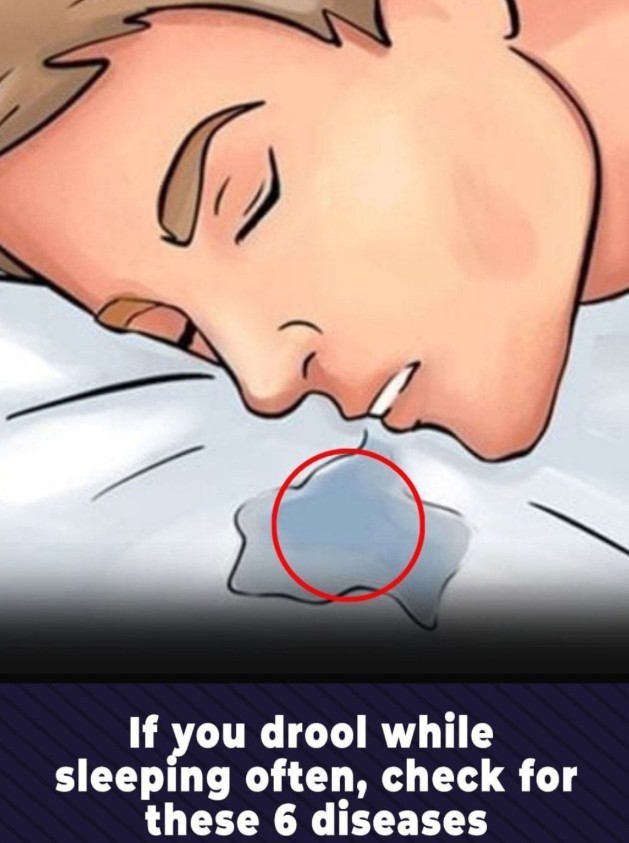What it is: A condition where stomach acid flows backward into the esophagus, irritating tissues and sometimes causing regurgitation.
How it links to drooling: Acid in the throat triggers salivation reflex and may cause mouth breathing or impaired swallowing, both of which can lead to drooling while sleeping.
Clues to look for: Heartburn, chest pain after meals, sour taste in mouth, hoarseness, worsening at night, possibly waking up drooling or with a wet pillow.
What to do: Discuss reflux treatment with your physician. Elevating the head of the bed, avoiding late meals, and managing weight may help.
3. Parkinson’s Disease (PD)
What it is: A chronic neurodegenerative condition characterized by tremor, rigidity, slowness of movement, and other motor & non‑motor symptoms.
How it links to drooling: PD can impair swallowing reflexes, reduce facial muscle tone, and increase saliva production. While drooling in PD is often during waking hours, nighttime drooling may also occur when muscle control is impaired.
Clues to look for: Tremors at rest, bradykinesia (slowness), stiffness, reduced facial expression (masking), sleep disturbances.
What to do: If you notice drooling plus any of the motor signs of PD, consult a neurologist for evaluation.
4. Stroke / Neurologic Injury
What it is: An interruption of blood supply to parts of the brain (ischemic or hemorrhagic), or injury to brain areas controlling swallowing or facial musculature.
How it links to drooling: Damage to nerves or muscles involved in swallowing or mouth closure can lead to saliva pooling or escaping during sleep. One‑sided facial weakness may make drooling more likely.
Clues to look for: Sudden onset of weakness or numbness (especially one side), facial droop, difficulty speaking or swallowing, drooling more on one side, changes after a suspected neurological event.
What to do: Immediate medical attention is required for suspected stroke. For post‑stroke residual drooling, rehabilitation and speech/swallowing therapy may help.
5. Arteriosclerosis / Vascular Insufficiency
What it is: Hardening or narrowing of arteries, which can impair blood flow to brain or facial muscles over time.
How it links to drooling: Chronic reduced muscle function or nerve control (from vascular compromise) may affect swallowing and oral muscle control, resulting in drooling while sleeping.
Clues to look for: History of hypertension, high cholesterol, diabetes; neurological or muscular symptoms like weakness, fatigue, drooling when asleep.
What to do: Manage cardiovascular risk factors aggressively (blood pressure, lipids, glycaemia), and mention persistent drooling to your physician as part of neurologic review.
6. Synucleinopathies / Other Neuromuscular or Neurodegenerative Disorders
(This category covers disorders such as amyotrophic lateral sclerosis (ALS), cerebral palsy residuals, or other brainstem/nervous system conditions.)
What it is: Conditions where neurological control over swallowing, facial muscles or saliva production is affected.
How it links to drooling: Impaired swallowing reflex, weak facial/oral musculature, abnormal nerve control can allow saliva to escape during sleep.
Clues to look for: Progressive muscle weakness, difficulties swallowing (dysphagia), drooling when awake or asleep, other neurologic signs (changes in speech, gait, coordination).
What to do: If drooling is persistent and unexplained, and especially if you have other neurologic signs, seek evaluation by a neurologist.
What Should You Do If You’re Drooling at Night Frequently?
-
Keep a sleep and symptom diary: note frequency of drooling, sleep position, other associated symptoms (snoring, choking, daytime sleepiness, nasal congestion).
-
Review medical history: allergies, sinus problems, reflux symptoms, neurological concerns, strokes, heart or vascular disease.
-
Mention it to your physician: Even if it seems minor, persistent drooling plus other signs merits evaluation of airway, swallowing, neurology, reflux and sleep health.
-
Check related signs: mouth breathing, open‑mouth sleep posture, frequent waking, snoring, choking, daytime fatigue, neurological or swallowing changes.
-
Address modifiable factors first:
-
Adjust sleep position (try back instead of side/stomach).
-
Manage nasal congestion or sinus problems (to reduce mouth breathing).
-
Elevate head and avoid late meals if reflux suspected.
-
Maintain good oral/dental health (mouth infections or misalignment may contribute).
-
-
Follow through on referrals: If your doctor suspects OSA, GERD, neurology or swallow issues — proceed with sleep study, endoscopy, neurologic testing or swallowing evaluation as recommended.
When It’s Urgent / Red Flags
Seek immediate medical attention if drooling (especially sudden onset) is associated with:
-
Facial droop, slurred speech, one‑sided weakness → possible stroke.
-
Marked difficulty swallowing or choking episodes.
-
Breathing stops at night or you wake gasping → potential sleep apnea.
-
Abrupt neurologic changes, muscle weakness or coordination loss → possible neuromuscular disease.
It’s important not to dismiss drooling simply as “sleeping funny” if it’s accompanied by any of the above.
Final Thoughts
Drooling during sleep is, in many cases, harmless and related to sleep position, nasal congestion or minor reflux. But when it becomes frequent, persistent, or accompanies other symptoms—especially those affecting breathing, swallowing, muscle control or neurologic function—it should be treated as a wake‑up call. Your body may be signaling an underlying issue that merits investigation.
Listening to your body, documenting what’s happening, and discussing it with your healthcare provider may uncover treatable conditions that, when addressed sooner rather than later, improve quality of life dramatically.

